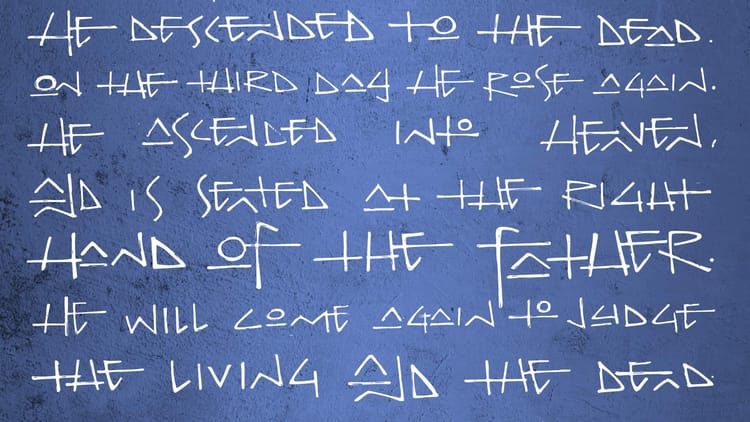Easter: Did It Really Happen?

Big Idea: Easter passes the credibility test, and meets the deepest needs of the heart.
If you asked me if there are any deal breakers when it came to Christianity, then I’d have to say there’s one. It’s the resurrection of Jesus Christ.
If the resurrection happened, then the implications are staggering. If the resurrection didn’t happen, then Christianity has no validity at all. I would stop following Jesus. I would shut down the church. I would do something else with my life, and I would encourage you to do the same.
I’m not alone in saying this. The Bible agrees with me. The apostle Paul, a man who once opposed Christianity, said this:
And if Christ has not been raised, your faith is futile and you are still in your sins. Then those also who have fallen asleep in Christ have perished. If in Christ we have hope in this life only, we are of all people most to be pitied. (1 Corinthians 15:17-19)
If Christ has not been raised, all of Christianity comes crashing down. The Christian faith is futile. The forgiveness of sins is nonsense. Death is the end. Christians are pitiable. If Easter didn’t happen, then there’s nothing that can be salvaged from the Christian faith. It’s that important.
I remember standing beside the grave of a friend of mine, and reading the words of Scripture about the resurrection. In that moment, I realized that I am either perpetrating a cruel lie, or I am speaking the most profound truth possible. There’s really no middle ground. It’s either a vicious hoax, or it’s a truth that changes everything.
So today, I want to look at this. Was Jesus really raised from the dead? Did the resurrection really happen?
As we consider this question, I want us to be as honest as possible. We want the evidence to speak. We can’t just assume the answer. Intellectual honesty demands that we answer the question honestly.
We have to admit: it’s not easy to believe in the resurrection. David Bowie died on January 10, two days after his 69th birthday, after an 18-month secret battle with cancer. If I told you that I saw him at Massey Hall last week, you’d conclude that I was either lying or that I’d lost my tenuous grip on reality. Nobody visits cemeteries to see if the people there are still dead. People who are dead stay dead.
This applies to Jesus as well. The resurrection of Jesus has always been hard to accept. It was hard to accept in biblical times. They had no categories for people coming back to life here and now. This was true, whether you were Jewish or Greek. Nobody could accept it, even back then, until they were compelled by the evidence.
So let me be clear: It’s never been easy to believe the resurrection. If it’s true, it’s a profound truth that changes everything. If it’s not true, then it’s time to shut down the church. So we need to look at the evidence, especially given the fact that resurrections aren’t exactly an everyday occurrence.
So what I want to do is to ask two questions. They’re two very different questions. The first is one that’s more modern, more evidence-based. It’s simply this: Did it happen? The second question is more of a post-modern question: what does it mean? The first question is historic; the second is theological. The first is about its credibility; the second is about its significance. I’m asking this because the resurrection has to pass two tests: first, that it’s non-contradictory, and second, that it’s livable.
Does Easter pass the credibility test?
So first: did Easter actually happen? Does it pass the credibility test?
To answer this question fairly, we actually have to answer two separate questions. The first is: did he actually die? The second is: did he actually rise from the dead?
So did he die? Occasionally you’ll hear a strange story about someone who is thought to be dead, but who comes back to life. Just this week I read about a baby in India who was declared dead, and woke up minutes before cremation was to take place. Some people — skeptics and Muslims — suggest that Jesus only appeared to die, but like Westley in The Princess Bride was only mostly dead.
What can we say to this? There is overwhelming evidence that Jesus actually died. Norman Geisler, a man who’s studied this, writes “The evidence for Christ’s death is greater than that for almost any other event in the ancient world.” Out of all the evidence, I just want to highlight two pieces: the nature of crucifixion, and testimony from others.
If we understood what crucifixion was like, there would be no question about the fact that Jesus actually died. He had no sleep the night before he was crucified. He was beaten and whipped. He collapsed while carrying the cross. The prelude to his crucifixion was enough that it brought him close to death. But then he was crucified.
He bled from gashes in his hands and feet, and from the thorns that pierced his scalp. He lost a lot of blood over the six hours he was crucified. Crucifixion required that the person pull themselves up by the nailed hands and feet in order to breath. Eventually, you would tire and be unable to lift yourself up anymore. Experts say that this would kill someone who was in good health.
On top of that, Jesus was speared to prove that he had died. An article in the Journal of the American Medical Association (21 March 1986) said:
Clearly, the weight of historical and medical evidence indicates that Jesus was dead before the wound to his side was inflicted and supports the traditional view that the spear, thrust between his right rib, probably perforated not only the right lung but also the pericardium and heart and thereby ensured his death. Accordingly, interpretations based on the assumption that Jesus did not die on the cross appear to be at odds with modern medical knowledge.
The soldiers, who were trained executioners, pronounced him dead. It was common practice to break the legs of those being crucified to speed death, so that the person could no longer breath. In Jesus’ case, they decided it wasn’t necessary. Pilate, who was in charge of that Roman promise, double-checked whether Jesus was dead before giving permission for him to be buried. Then he was wrapped in a hundred pounds of cloth and spices, and buried in a tomb for three days. If he wasn’t dead by then, the lack of food, water, and medical treatment would have finished him off.
Not only that, but there’s lots of external evidence that he died. Both Jewish and Roman historians from that time record his death. There’s overwhelming evidence that Jesus died.
But what about his resurrection? It’s much easier to believe that someone really died than that they really came back from the dead. Well, there are a lot of reasons to believe that the resurrection really took place as well. Let me just highlight two lines of proof, although there are many more.
- Appearances — He appeared to Mary Magdalene and to some other women. If you were made up the resurrection as a myth, you would never make up that he appeared to women first, because the testimony of women wasn’t accepted back then. The only reason to claim this would be if it was true, because it’s just not something you’d make up. But then Jesus appeared to the disciples, many of whom doubted at first. He ate with them. He ultimately appeared to 500 people at one time. Over 40 days, hundreds of people saw him alive. He was touched, and he ate food. Eyewitness accounts, especially by so many people, demand an explanation.
- Effects — Then there are the effects of the resurrection. After Jesus was killed, all of his followers were scattered and afraid. Something happened to transform them into fearless men and women who transformed the Roman world, and were willing to die with courage for Jesus. Their dominant message — the thing they couldn’t stop talking about — was the resurrection of Jesus. Something has to account for that transformation, and the sudden growth and appearance of the church that spread throughout the Roman empire.
That’s not even getting into the other lines of evidence — the Scriptural predictions that were fulfilled; the fact that a heavily-guarded tomb was found to be empty, and a body missing; the fact that the authorities who killed Jesus didn’t organize a search or produce a body, but instead organized a coverup; and the conversion of skeptics like the apostle Paul, a persecutor of the church, and James, the half-brother of Jesus.
The evidence is so overwhelming that Norm Geisler says:
There are more documents, more eyewitnesses, and more corroborative evidence than for any other historical event of ancient history. The secondary, supplementary evidence is convincing; when combined with the direct evidence, it presents a towering case for the physical resurrection of Christ. In legal terminology, it is “beyond all reasonable doubt.”
Virtually everyone — Christians and skeptics alike — agree on four things: that Jesus died; that his tomb was empty, and the body never found; that Jesus’ disciples believed that they saw him resurrected from the dead; and that the disciples were transformed following their alleged resurrection observations. The case is so strong that there’s a burden of proof on those who disbelieve the resurrection to account for these facts. It’s not simply enough to believe that Jesus didn’t rise from the dead. You have to come up with a plausible explanation for all of these facts, which is hard to do.
I heard recently of a teacher, a Christian, who was a little sneaky. He said to his students, “It’s about time that we disproved the resurrection!” He assigned them a research project, looking at the evidences for the resurrection and disproving them.
He knew what he was doing. The students came back, and many of them had come to believe the resurrection, because they found the evidence to be so compelling.
As someone put it:
The evidence for Jesus’ resurrection is so strong that nobody would question it except for two things: First, it is a very unusual event. And second, if you believe it happened, you have to change the way you live. (Wolfhart Pannenberg)
I’d encourage you to examine the evidence for the resurrection. The evidence is compelling, and it’s virtually impossible to explain away. Easter passes the credibility test.
But I don’t want to just look at the facts today. I want to ask a second question.
Does Easter change our lives?
I was reading this week about Francis Schaeffer, a American theologian, philosopher, and pastor. He believed that all truths had to meet two requirements. First, the truth had to be non-contradictory. Second, the truth had to be able to be lived out consistently. In other words, it’s not enough for something to be true. It also has to be life-changing as well.
The fact is that Easter passes the credibility test, and meets the deepest needs of the heart. It’s not just true, but it’s also meaningful.
We’re going to look at this in more detail over the coming weeks. There are lots of things we can say about how Easter changes things. We could talk about what it means about Jesus. We could talk about what it means for our future resurrection. But today I want to speak very personally about the way that it changes the way we live, right here, right now.
A couple of weeks ago, I attended a lecture by Mark Jones, author of a new book called Knowing Christ. I had heard good things about the book, and I know that Jones is a brilliant theologian, as well as a good pastor.
I attended the lecture, and Jones spoke on the humiliation of Christ. “There has never been a greater humiliation of a person than that of Jesus,” he said. “No one has ever descended so low because no one has ever come from so high.” Jones spoke compellingly about how Jesus joyfully, freely, and willingly became nothing for us. His whole life was one of humiliation — his birth and childhood, his ministry, his trial and execution, and his burial. I was transfixed and moved as Jones gave his lecture. “The readiness of Jesus to efface himself to the lowest pit of debasement, when he did not need to, should bring Christians to their knees in humble adoration of our Savior,” he said.
But then it struck me. I’m moved, as I should be, as I think about the humiliation of Jesus. But then I realized something. A few weeks ago I visited the home of Andrew Jackson, seventh president of the United States. I can know about Andrew Jackson, but I can’t know him, because he’s dead. But that’s not true of Jesus. I can know about Jesus, but because of his resurrection, I can do more than that, and so can you. I can know him. I can be in a relationship with him, and he with me. The resurrection isn’t just an historical fact. It also meets the deepest needs of our hearts, because we can know him.
In Philippians 3, the apostle Paul — a former persecutor of the church who encountered the risen Jesus — writes this:
Indeed, I count everything as loss because of the surpassing worth of knowing Christ Jesus my Lord. For his sake I have suffered the loss of all things and count them as rubbish, in order that I may gain Christ and be found in him, not having a righteousness of my own that comes from the law, but that which comes through faith in Christ, the righteousness from God that depends on faith—that I may know him and the power of his resurrection, and may share his sufferings, becoming like him in his death, that by any means possible I may attain the resurrection from the dead. (Philippians 3:8-11)
Here, Paul says that the main pursuit of his life, his driving passion, is to know Christ. Not just to know about him, but to know him. And not only can we know him, but we can experience the power of his resurrection in our own lives. We can be changed by him.
So not only is the resurrection true, but it’s captivating. If it is true, then it opens up a world of change. It means that the resurrection of Jesus isn’t just an historical fact. It is a reality that we can experience today. It opens us up to a relationship with the risen Lord, who has been serving and pursuing us all along.
As James Allen Francis wrote of him:
He was born in an obscure village, the child of a peasant woman. He worked in a carpenter shop until He was thirty. Then for three years He was an itinerant preacher. He never wrote a book. He never held an office. He never had a family. He never owned a house. He never went to college. He never traveled more than two hundred miles from the place where He was born. He never did one of the things that usually accompany greatness. He had no credentials but Himself. He was only thirty-three when the tide of public opinion turned against Him. His friends ran away. He was nailed to the cross between two thieves. When He was dead, He was laid in a borrowed grave through the pity of a friend. Twenty centuries have come and gone, and today He stands as the central figure of the human race. I am far within the mark when I say that all the armies that ever marched, all the navies that ever sailed, all the parliaments that ever sat, all the kings that ever reigned, have not affected the life of man on earth as has this one solitary life.
That’s our Jesus, who was raised from the dead. You can know him — not just know about him, but know him. Easter passes the credibility test, and meets the deepest needs of the heart.





